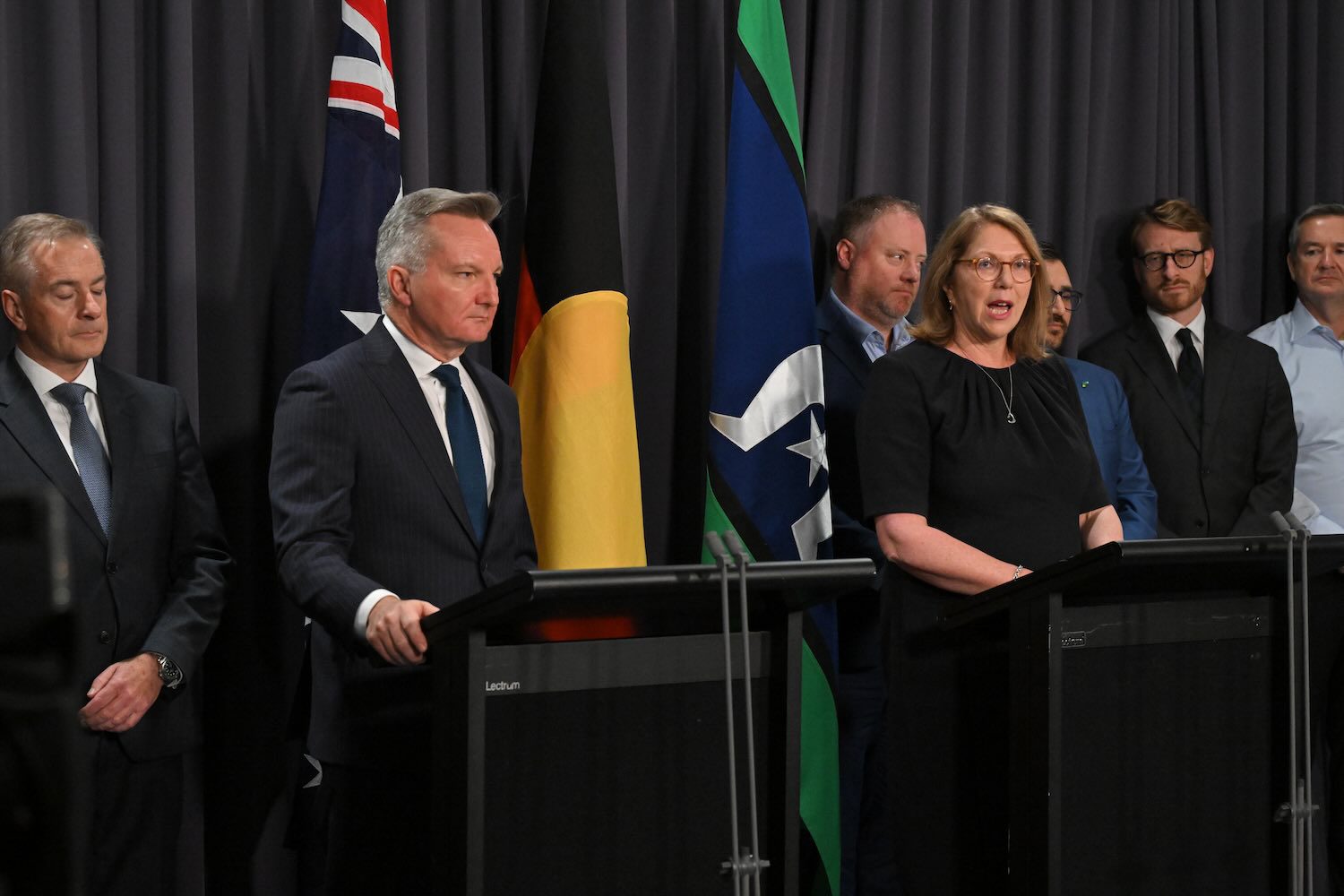The federal authorities has bowed to strain from the automobile business, asserting it’ll loosen up proposed emissions guidelines for utes and vans and delay enforcement of the brand new requirements by six months.
The laws was launched to parliament on Wednesday. The federal government says the brand new guidelines give Australian motorists a higher selection of electrical car fashions and insists the coverage is “good for the atmosphere”.
However on the latter level, the federal government is mistaken. The amended guidelines will gradual the discount in emissions from Australia’s polluting highway transport sector. And so they mirror home and worldwide traits that, taken collectively, enhance the chance Australia, and the world, will fail to realize net-zero emissions by 2050.

What are the modifications?
Car emissions requirements set a restrict on grams of CO₂ that may be emitted for every kilometre pushed, averaged throughout all new vehicles offered. Carmakers failing to satisfy the requirements will incur monetary penalties.
The federal authorities launched its preliminary model of proposed car emissions requirements in February.
Underneath the modifications introduced this week, some 4WD wagons – such because the Toyota LandCruiser and Nissan Patrol – will likely be reclassified from “passenger automobile” to “gentle business car”. The change means much less stringent emissions requirements will apply to these fashions.
In an announcement, the federal government justified the change by saying some off-road wagons have the same chassis and towing capability to autos within the light-commercial class, and so must be topic to the identical requirements.
The federal government may also give extra beneficial remedy to heavier autos. And producers won’t be penalised below the scheme till July 2025 – six months later than the federal government initially proposed.

The worldwide image
The federal government’s resolution to weaken the requirements is a response to strain from the home car business, and a concession to the Opposition which falsely claims the brand new requirements are a “ute tax”.
However the watering-down additionally displays a broader worldwide development during which the legacy car business is backing away from its earlier commitments to a fast transition to electrical autos.
For instance, in america Ford and GM have each in the reduction of manufacturing of some fashions, reportedly as a consequence of lower-than-expected client demand.
Additionally within the US, carmakers this month secured a rest of the Biden administration’s gas effectivity targets for brand new car gross sales.
US politicians are additionally pushing for elevated tariff safety from imports, already taxed at 27.5%. This could make US producers much more aggressive in opposition to huge Chinese language electrical car manufacturers reminiscent of BYD.
Toyota, the world’s largest automobile maker, has gone all-in on hybrid electrical autos, starting with the extremely profitable Prius. However as the worldwide market has shifted to totally electrical vehicles, Toyota has fought in opposition to additional tightening of requirements.
Pressures in Australia
Australia now not has a home automobile manufacturing business. However international carmakers proceed to exert highly effective affect by the Federated Chamber of Automotive Industries, Australia’s peak business physique for producers and importers of passenger and light-commercial autos. The chamber has persistently lobbied in opposition to efficient local weather motion.
The federal government’s settlement to weaken requirements additionally displays the prevailing assumption, apparently shared by each main events, that tradespeople comprise nearly all of the “working class” voters for whom they’re vying.
Nevertheless it’s an out-of-date assumption. Within the Eighties, the occupations becoming a broad interpretation this time period (trades and technical staff, equipment operators and labourers) accounted for 40% of all employed staff, and a majority of full-time non-managerial staff.
However at present, solely 28% of staff match this description. Staff with skilled {qualifications}, reminiscent of academics and nurses, outnumber trades and technical staff two to 1. However their considerations are steadily dismissed by some politicians as these of a woke, inner-city minority.
Utes are altering
The shift from substance to image regarding the working class is mirrored within the transformation of utes themselves.
Till comparatively lately – and because the title implies – utes have been utilitarian autos designed for the sensible duties of carrying a farming couple “to church on Sundays and the pigs to market on Mondays”. However over time, this has been changed by varied types of cosplay.
Utes have been tricked out with sports activities bars and fancy wheels, metallic paint and so forth. Extra lately, the normal ute has been changed by US-style pickups, usually offered in dual-cab configurations.
Most fashions of the market-leading Ford Ranger don’t even provide a single-cab model, although such variations are offered abroad.
These autos are large, however many have far much less carrying capability than a conventional ute. For instance, the Ram 1500 has a bath size of 1.7 metres, in comparison with about 2.4 metres for the tray of a regular single-cab ute.
Until the expansion within the dimension of passenger autos is stopped and reversed, Australia’s process of assembly our net-zero goal will likely be much more troublesome.
It’s unlikely the 2 huge events will act on this situation any time quickly. However as local weather change worsens, the necessity to wean ourselves from monster vehicles and internal-combustion engines will demand the eye of our political leaders.![]()
John Quiggin, Professor, College of Economics, The College of Queensland
This text is republished from The Dialog below a Artistic Commons license. Learn the unique article.